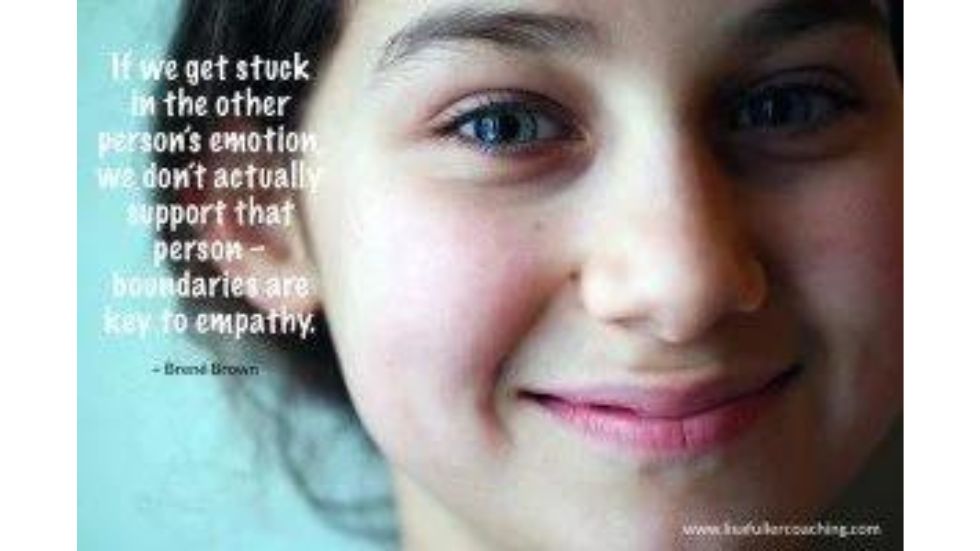
by Lisa Fuller | Jan 29, 2015 | Communication, Connection & Love, Encouragement, General, Parenting
Q: As the mother of a middle school girl, I struggle to be empathetic without jumping on the roller coaster of her ever-changing moods, emotions and dramas. And, as a woman in her late 40s, my emotions are often a 6 Flags of hormonally-induced thrills, so staying detached feels nearly impossible at times
Recently my seventh grader tried out for the school musical. After a series of micro disappointments this Fall (not making the “A” soccer team, getting put into an advisory group without any good friends, being just slightly outside of the ‘cool’ group, etc.), she was serious about getting a good part for the show. She practiced her song with a singing teacher several times and felt good about it.
Several days went by while she waited for the cast list to be posted. I worked on shifting her language away from ‘good’ and ‘bad’ parts in the show, to some limited success. I wanted to support her enthusiasm but it was draining to stay positive given my fear of the potential bad news ahead.
This daughter can be fairly stoic, but when she saw the cast list, she ran up to her room and sobbed so loudly I was afraid she would choke.
After a few minutes of trying to let her release her disappointment on her own, I went in to check on her. With your thoughts of empathy fresh in my mind, I resisted the temptation to tell her the emotions would pass or it didn’t matter or that the part was probably better than she thought, blah, blah, blah.
Instead, I let her cry, supporting the wildly strong feelings raging through her. Unfortunately, it was just a matter of time before I was crying too, and then we were both sobbing at the injustice of the world (did I mention I am a pre-menopausal woman with raging emotions?)
I managed to get myself together and put her to sleep, but then I could not stop crying. I just felt so sad for her and could not put it away. It took all the strength I had not to email the drama teacher and ask her if there was any way to revisit the cast list. Which is just a simply INSANE thing to even think, let alone seriously consider!
So here’s my question: how can we support our children with their dreams, projects, efforts and goals (especially our daughters) without getting enmeshed in the outcome? How can we let our older children navigate the disappointments and challenges of life without getting sucked into the emotional turmoil that goes along with the journey? Where do you draw the line between empathy and over involvement/attachment?
A: First, Michelle, congratulations on your success in avoiding many of the common barriers to empathy. What you did was no small feat — staying out of judgement, taking her perspective and touching a place in yourself (maybe a bit too deeply) that understood her feelings.
Simply defined as “the ability to understand and share the feelings of another,” empathy is nuanced. While you were able share your daughter’s feelings, it proved difficult to pull yourself out.
To answer your question, here are my ideas to strengthen your empathetic response even more while simultaneously moving you out of the helicopter parenting zone altogether.
From Helicopter Parenting to Empathy
- Validate her feelings. In your story Michelle, you give nice examples of how you did this — letting her cry and stay in her feelings, etc.
- Resist the urge to fix. You write, I resisted the temptation
 to tell her the emotions would pass or it didn’t matter or that the part was probably better than she thought, blah, blah, blah. This is cause for celebration! When you’re done partying let’s look at what you describe your fear of the potential bad news that she didn’t get a “good” part. Your feeling of fear fuels your underlying belief that something needs to be fixed. You can do one of two things here, keep your fear AND bite your tongue, which
to tell her the emotions would pass or it didn’t matter or that the part was probably better than she thought, blah, blah, blah. This is cause for celebration! When you’re done partying let’s look at what you describe your fear of the potential bad news that she didn’t get a “good” part. Your feeling of fear fuels your underlying belief that something needs to be fixed. You can do one of two things here, keep your fear AND bite your tongue, which
you did, or, with the help of a friend, coach or therapist, internally shift your perspective from disappointment = bad to disappointment = opportunity for growth. (I’ll go into this more in my next post). What I’m suggesting is more than a surface shift — that’s why it requires support.
- Share your own story of disappointment. By sharing a simple one sentence story of a time you didn’t make the team or you weren’t invited to the party, you let your daughter know that she’s not alone and most importantly, that she belongs. (A sense of belonging in family is profoundly impactful to a child’s sense of well-being.) For example, I remember when I longed to be chosen to play the role of Mary in the church nativity, yet I wasn’t picked and I felt terribly sad. One sentence that’s it. I can hear parents ask “Isn’t there more to say than that?!” No — children are self focused, your goal here is to simply let them know you’ve been there — voila.
- Be present. It’s not what you say that will make a difference, but simply your presence, your ability to be with your child. Ground yourself in what’s most important to you, tuck your phone and other distractions away and like the Beatles so beautifully sang, let it be.
- Practice mindfulness. Mindfulness strengthens our ability to have boundaries which according to Brené Brown’s research is key to empathy. If we get stuck in the other’s emotion, we don’t actually support that person – boundaries are key to empathy.
One of the many gifts in your story is how fully engaged you are in your daughter’s life.
Thank you Michelle for sharing your story and question, deepening our understanding of empathy. I appreciate and honor your willingness to be vulnerable — it can feel scary to divulge our struggles when we’re “supposed to be” the all-knowing parent!
Are you wanting someone to walk you through a parenting challenge like the one that Michelle shared? If so, visit my schedule to find a time for us to meet via phone or Skype.
I know that parenting is important to you — it’s worth taking time for yourself, so that you can be the parent you want to be, even in your most challenging circumstances.
Take a moment to share in the comment section below how you relate to Michelle’s story and what you want to remember from today’s post.
If you haven’t already done so, join me on this journey!
Wanna talk? Schedule a time here.

by Lisa Fuller | Apr 29, 2014 | Connection & Love, Cooperation, General, Parenting, Self-regulation
You know those times when you’ve just got to get your child to do something important (go to the doctor, to swim class, the dentist…) and she/he refuses to cooperate? Then you think, “Why can’t they just get with the program this one time? Why does everything have to be so hard?”
Well, let me introduce Susan, mother of 9 year-old Alex, and a recent graduate of my 7-week parenting class. In this story, Susan shares the remarkable shift that happens when she uses tools she learned in the series. Without giving too much away, here are the two conversations (with very different outcomes) between Susan and Alex:
BEFORE taking Positive Discipline Class
Susan: “Hey Alex, Dad and I forgot to tell you – Swim lessons start today, so you need to get ready to go.”
Alex: (Playing with Legos) “What? I don’t want swim lessons! You know I hate lessons!”
Susan: “Alex, learning how to swim is really important – it’s about safety.”(Susan begins to feel angry and thinks, “What’s so hard about going to swim class? Swimming is great. This should be fun. Why is it so difficult?”)
Alex: “I don’t want to.”(He starts to crush his elaborate Lego creations). “I’m not going.”(He sits defiantly on the couch.)
Susan: “Swim lessons are a privilege, young man. That’s enough of your whining. Stop it. Now!”
Alex: “You never ask me what I want – I HATE YOU!”
Susan: (Thinking… “I hate this. I hate how hard it is to motivate my son. Forget it, I give up.”) She stomps off to another room to grab the swim gear.
Susan: “We paid for this class. Now get up and get to the car!”
Susan and Alex are both miserable and swim lesson does not go well.
Sound familiar?
AFTER taking Positive Discipline Class
Susan: (Taking some time beforehand to prepare herself.) “Hey Alex, Dad and I forgot to tell you but you’ve got swim lessons today. I’m really sorry that we’re springing this on you, but we gotta go now. I’ve got your swim gear and a snack for the car.”

“Both of these Positive Discipline Tool Cards were key. I feel I learned the most about the power of validating feelings!“
Alex: “What? I don’t want swim lessons! You know I hate lessons!”
Susan: “Honey, you only have to go four times and we found a new place where there are fewer kids so you’ll be able to hear better.” (She shows remorse for not giving him any warning and feels empathy for him, knowing that while he hates lessons, he actually loves to swim.)
Alex: “I don’t want to!” (He starts to crush his Lego creations.) “I’m not going.” (Alex plops himself defiantly on the couch.)
Susan: “Alex, sweetie, I know this is upsetting, but destroying your Legos is not OK. You can hit a pillow if you’re angry.” (She allows him to express his feelings. She calmly and firmly tells Alex that swim lessons are something he just needs to do. Susan uses only one or to sentences instead of lecturing him.)
(Alex violently hits the pillow. Susan leaves the room. Then she remembers that staying with him might feel encouraging to him. She goes back and keeps him company but doesn’t try to fix or change his feelings.)
Susan: (After some time has passed, speaking gently…) “Honey, it’s time to go.” (Alex gets up and together, they walked to the car. During the drive Susan felt connected to her son through their easy conversation and a palpable sense of calm. Alex even seemed to enjoy the lesson!)
This story’s a beautiful example of how empathy and encouragement go a long way toward winning genuine cooperation. Through her use of grounded positive energy and empathy Susan not only accomplished her goal of getting Alex to his swim lesson, she laid the groundwork for a foundation of trust.
Later she she told me,
It was a tiny miracle that I didn’t lose it and Alex was able to get up to walk to the car. It worked mostly because I didn’t flip my lid. Being there while he hit the pillow actually calmed me down too! Now Alex is doing great with his lessons. He still complains, but there is an ease and matter-of-factness about our interactions.
Thank you Susan for sharing your story!
If you’re curious about deepening your parenting practice and learning the art of cooperation through empathy, check out my one-on-one coaching opportunities and it you’re in the Bay Area, my fall Positive Discipline Series.
CONSIDER⇔SHARE⇔ACT
What gets in your way of just being with your child while they’re caught up in a feeling? Next time a big emotion hits, try bearing it with an attitude of love and let us know what happens!!

by Lisa Fuller | Nov 26, 2013 | Connection & Love, General, Parenting
Over dinner recently, my dear friend Katie, a graduate of one of my very first parenting classes, shared her biggest take away from the series: THE MESSAGE OF LOVE. I asked “What effect does this concept have on your parenting today?” She answered,
“For me, the message of love means continually focusing on the big picture with my kids and letting them know that I love them. I apologize for my behavior when I lose it with them. They’re used to that. Even though I make plenty of mistakes and am not a perfect mother, I’m certain they know how much I love them. Every day I’m aware of the value of communicating that love, even in the smallest interactions.”
Today’s message is simple.
How do you show your love within and beyond the many daily acts of caring — the chauffeuring, cooking, laundering…?
Ironically, the hectic pace of Thanksgiving, with all of the preparations, attendant traveling, cooking, and socializing, can distract us from a grounded connection with our kids.
Remember for a moment, someone from your own childhood who you knew cared about you. How did you know? What did they do?
Maybe they spend time with you, listened to you, taught you a skill or game.
Below is a list of ideas, with concrete examples, for communicating the message of love. This list is a beginning. Please share your ideas in the comment section below!
Shared experiences
• Play a game together (we’re into Sorry right now – especially the 14 year old!)
• Cook together (favorites: eggs, lemon squares, help with prepping anything)
• Learn to do something together (friendship bracelets)
• Work together on a project (put together an Ikea desk, replay chess champion game moves, garden)
• Wrestle and rough house
• Walk the dog or take a hike
Empathetic communication
• Deeply listen to your child – no devices, no interruptions.
• Use phrases that convey empathy, such as:
- You seem__________.
- You look___________.
- You sound__________.
- You are____________.
Body language/tone of voice/alignment of internal and external energy
Be aware of how loving you feel on the inside. Notice how this is reflected on the outside by your facial expressions and body language. When these match you’ll come across with
- Soft face & open heart
- Warm, relaxed tone of voice
- Sincerity and empathy
- With an older child closet listening is a great option.
Katie reminded me – THE MESSAGE OF LOVE is powerful!
Take the time to BE with your children and communicate the message of love in your own, imperfect way. (Maybe it’s about not sweating the small stuff).
Take a moment to share in the comment section below how the MESSAGE OF LOVE is communicated in your family!

 to tell her the emotions would pass or it didn’t matter or that the part was probably better than she thought, blah, blah, blah. This is cause for celebration! When you’re done partying let’s look at what you describe your fear of the potential bad news that she didn’t get a “good” part. Your feeling of fear fuels your underlying belief that something needs to be fixed. You can do one of two things here, keep your fear AND bite your tongue, which
to tell her the emotions would pass or it didn’t matter or that the part was probably better than she thought, blah, blah, blah. This is cause for celebration! When you’re done partying let’s look at what you describe your fear of the potential bad news that she didn’t get a “good” part. Your feeling of fear fuels your underlying belief that something needs to be fixed. You can do one of two things here, keep your fear AND bite your tongue, which




